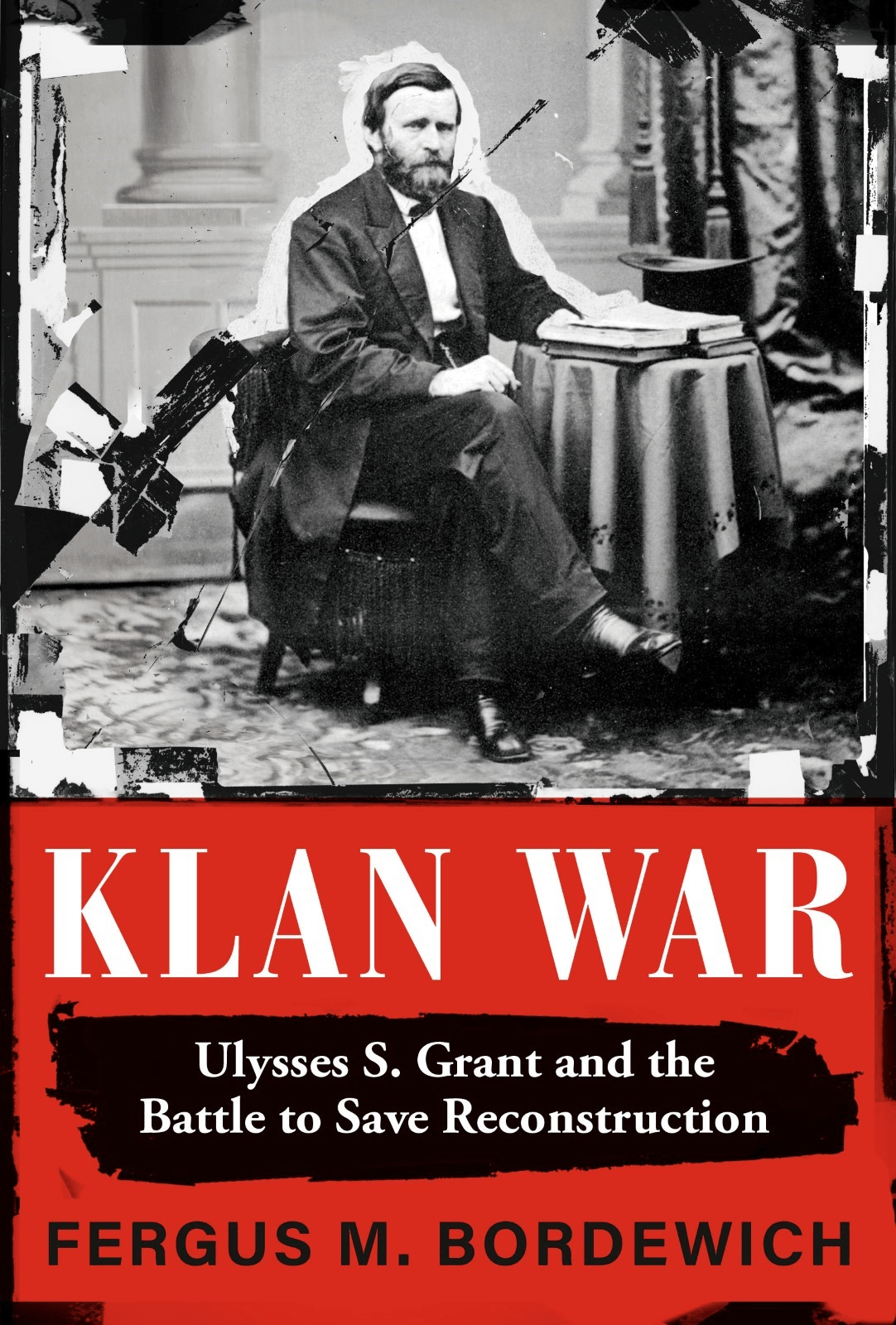Discover the pivotal role of Ulysses S. Grant in the battle against the Ku Klux Klan in our latest webinar, featuring acclaimed historian and author Fergus M. Bordewich. Together, we explored his latest book, “KLAN WAR: Ulysses S. Grant and the Battle to Save Reconstruction.“
 In this compelling historical account, we learn about the first national anti-terrorism campaign waged on American soil. Bordewich challenges the traditional perception of Ulysses S. Grant as a weak president. Instead, he portrays him as a powerful advocate for civil rights who used the federal government’s power to combat the Klan’s violent campaign against newly liberated Black Americans and their allies.
In this compelling historical account, we learn about the first national anti-terrorism campaign waged on American soil. Bordewich challenges the traditional perception of Ulysses S. Grant as a weak president. Instead, he portrays him as a powerful advocate for civil rights who used the federal government’s power to combat the Klan’s violent campaign against newly liberated Black Americans and their allies.
This book takes us to the front lines, detailing events in the former Confederate States and the political battles within Congress. It highlights the efforts of grassroots Black leaders and key figures, such as Senator Carl Schurz, who sacrificed the rights of Black Americans in the name of political “reform,” and Nathan Bedford Forrest, a ruthless former slave trader and Klan leader.
We took a closer look at a critical period after the Civil War when the Ku Klux Klan, which Bordewich defines as “the first organized terrorist movement in American history,” emerged as a major threat, and their violent efforts to obstruct progress during Reconstruction.
Additionally, our discussion shed light on the ongoing struggle to protect civil rights and the need for continued efforts to combat hate groups and white supremacist ideologies.
 Fergus M. Bordewich has been an independent writer, historian, and journalist since the early 1970s. In 2015, he served as chairman of the awards committee for the Frederick Douglass Book Prize, given by the Gilder-Lehrman Center for the Study of Slavery, Resistance, and Abolition, at Yale University. He is a frequent public speaker at universities and other forums, as well as on radio and television. His articles have appeared in many magazines and newspapers, including the New York Times, Wall Street Journal, Smithsonian, American Heritage, Atlantic, Harper’s, New York Magazine, GEO, Reader’s Digest, and others. As a journalist, he traveled extensively in Asia, the Middle East, Europe, and Africa, writing on politics, economic issues, culture, and history, on subjects ranging from the civil war in Burma, religious repression in China, Islamic fundamentalism, German reunification, the Irish economy, Kenya’s population crisis, among many others. He also wrote the script for a PBS documentary about Thomas Jefferson and the founding of the University of Virginia: Mr. Jefferson’s University.
Fergus M. Bordewich has been an independent writer, historian, and journalist since the early 1970s. In 2015, he served as chairman of the awards committee for the Frederick Douglass Book Prize, given by the Gilder-Lehrman Center for the Study of Slavery, Resistance, and Abolition, at Yale University. He is a frequent public speaker at universities and other forums, as well as on radio and television. His articles have appeared in many magazines and newspapers, including the New York Times, Wall Street Journal, Smithsonian, American Heritage, Atlantic, Harper’s, New York Magazine, GEO, Reader’s Digest, and others. As a journalist, he traveled extensively in Asia, the Middle East, Europe, and Africa, writing on politics, economic issues, culture, and history, on subjects ranging from the civil war in Burma, religious repression in China, Islamic fundamentalism, German reunification, the Irish economy, Kenya’s population crisis, among many others. He also wrote the script for a PBS documentary about Thomas Jefferson and the founding of the University of Virginia: Mr. Jefferson’s University.
Bordewich is the author of nine non-fiction books: KLAN WAR: Ulysses S. Grant and the Battle to Save Reconstruction, (Alfred A. Knopf, 2023); CONGRESS AT WAR: How Republican Reformers Fought The Civil War, Defied Lincoln, Ended Slavery, And Remade America, (Alfred A. Knopf, 2020); THE FIRST CONGRESS: How James Madison, George Washington, and a Group of Extraordinary Men Invented the Government (Simon & Schuster, 2016. Winner of the 2019 D.B. Hardeman Prize), AMERICA’S GREAT DEBATE: Henry Clay, Stephen A. Douglas, and the Compromise that Preserved the Union (Simon & Schuster, 2012. Winner of the 2012 Los Angeles Times History Prize); WASHINGTON: The Making of the American Capital (Amistad/HarperCollins, 2008); BOUND FOR CANAAN: The Underground Railroad and the War for the Soul of America (Amistad/HarperCollins, 2005); MY MOTHER’S GHOST, a memoir (Doubleday, 2001); KILLING THE WHITE MAN’S INDIAN: Reinventing Native Americans at the End of the Twentieth Century (Doubleday, 1996); and CATHAY: A Journey in Search of Old China (Prentice Hall Press, 1991).

The Ku Klux Klan, which celebrated historian Fergus Bordewich defines as “the first organized terrorist movement in American history,” rose from the ashes of the Civil War. At its peak in the early 1870s, the Klan boasted tens of thousands of members, no small number of them landowners, lawmen, doctors, journalists, and churchmen, as well as future governors and congressmen. Their mission was to obliterate the muscular democratic power of newly emancipated Black Americans and their white allies, often by the most horrifying means imaginable.
To repel the virulent tidal wave of violence, President Ulysses S. Grant waged a two-term battle against both armed Southern enemies of Reconstruction and Northern politicians seduced by visions of postwar conciliation, testing the limits of the federal government in determining the extent of states’ rights. In this book, Bordewich transports us to the front lines, in the hamlets of the former Confederate States and the marble corridors of Congress, reviving an unsung generation of grassroots Black leaders and key figures such as crusading Missouri senator Carl Schurz, who sacrificed the rights of Black Americans in the name of political “reform,” and the ruthless former slave trader and Klan leader Nathan Bedford Forrest.


